Internet Happenings, Events and Sources
| Marcus P. Zillman, M.S., A.M.H.A. Author/Speaker/Consultant Internet Happenings, Events and Sources |
|
Friday, September 30, 2005 Lingua MOO http://lingua.utdallas.edu/ Lingua MOO was created in 1995 by Cynthia Haynes (UT-Dallas) and Jan Rune Holmevik (University of Bergen, Norway) to serve primarily the University of Texas at Dallas Rhetoric and Writing program and their School of Arts & Humanities and the University of Bergen's Department of Humanistic Informatics. Lingua MOO functions as both a learning environment for their students and a broader community for research and collaboration on projects situated at the intersection of Arts & Humanities and electronic media. Since 1995 Lingua MOO has also become home to an international network of researchers in these areas. They have classes and professional academic organiztions meeting at Lingua MOO from such countries as Norway, Germany, Korea, Australia, South Africa, Denmark, and England, just to name a few. Lingua MOO is also the foundation for their broader educational MOO open source project called enCore. Educators may obtain the enCore educational MOO database and server software FREE from the enCore website enabling them to set up their own educational MOO customized to meet the specific purpose of their institution or department. They estimate there are several hundred enCore MOOs around the world serving the teaching of such subjects as writing, rhetoric, foreign languages, English as a second language, astronomy, library reference and instruction, children's therapy, among others. System requirements for users are minimal because the MOO uses a web browser as the client, so there's no need on their part to download software. Educational MOOs are excellent supplements to traditional classroom instruction, but may also serve as the sole means of delivery for distance learning courses. This will be added to Education and Distance Learning Resources 2005 Internet MiniGuide. This has been added to Research Resources Subject Tracer™ Information Blog. posted by Marcus Zillman | 4:15 AM MediaMOO - Media Researchers http://www.cc.gatech.edu/~asb/MediaMoo/ MediaMOO is a professional online community for media researchers. It is a place to come meet colleagues in media studies and related fields and brainstorm, to hold colloquia and conferences, and to explore the serious side of this new medium. MediaMOO is a research project of Amy Bruckman started at the Epistemology and Learning Group at The MIT Media Lab, and is now hosted at the College of Computing at Georgia Tech. This has been added to Research Resources Subject Tracer™ Information Blog. posted by Marcus Zillman | 4:10 AM Mud Magic http://www.mudmagic.com/ This is an Online Text Games - Muds site and is a very exhaustive resource site for MUDS and online text games. This has been added to Games Resources Subject Tracer™ Information Blog. posted by Marcus Zillman | 4:05 AM 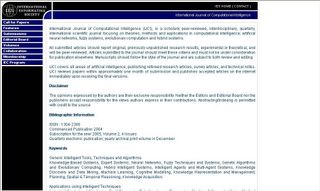 International Journal of Computational Intelligence International Journal of Computational Intelligence (IJCI) http://www.enformatika.org/journals/1304-2386/ International Journal of Computational Intelligence (IJCI), is a scholarly peer-reviewed, interdisciplinary, quarterly, international scientific journal focusing on theories, methods and applications in computational intelligence; artificial neural networks, fuzzy systems, evolutionary computation and hybrid systems. All submitted articles should report original, previously unpublished research results, experimental or theoretical, and will be peer-reviewed. Articles submitted to the journal should meet these criteria and must not be under consideration for publication elsewhere. Manuscripts should follow the style of the journal and are subject to both review and editing. IJCI covers all areas of artificial intelligence, publishing refereed research articles, survey articles, and technical notes. IJCI reviews papers within approximately one month of submission and publishes accepted articles on the internet immediately upon receiving the final versions. This has been added to Artificial Intelligence Resources Subject Tracer™ Information Blog. posted by Marcus Zillman | 4:00 AM Thursday, September 29, 2005 China Information - A Journal on Contemporary China Studies http://cin.sagepub.com/ China Information presents timely and in-depth analyses of major developments in contemporary China and overseas Chinese communities in the areas of politics, economics, law, ecology, culture, and society, including literature and the arts. China Information pays special attention to views and areas that do not receive sufficient attention in the mainstream discourse on contemporary China. It encourages discussion and debate between different academic traditions, offers a platform to express controversial and dissenting opinions, and promotes research that is historically sensitive and contemporarily relevant. The journal's mission to promote exchanges between different academic traditions is reflected in its awareness of the important contributions made by scholars outside the Anglo-Saxon world. It actively seeks to reflect the diversity of scholarships and research agendas in America, Europe, Japan, and China. The journal includes book reviews that cover publications from mainland China, Taiwan, Hong Kong, Japan, France, and the German-speaking areas. In addition, China Information transcends the conventional boundaries between social sciences and humanities and encourages cross-fertilization between disciplines. This will be added to International Trade Resources 2005 Internet MiniGuide. posted by Marcus Zillman | 4:15 AM The Center for Jewish History Genealogy Institute http://www.cjh.org/family/ The Genealogy Institute helps new and experienced family history researchers learn about the world of their ancestors. They help you learn about your ancestors by providing reference and educational services, and creating programming on family history and its connections to the broader sweep of Jewish history. The Institute also leads researchers to the primary sources at the Center: Yizkor books and landsmanshaft records at YIVO, family and community histories at the Leo Baeck Institute, and military records at the American Jewish Historical Society are just a few of the rich primary sources open to researchers. This has been added to Genealogy Resources Subject Tracer™ Information Blog. posted by Marcus Zillman | 4:10 AM Updated: XQuery, XSLT 2.0 and Supporting Documents The XML Query and XSL Working Groups have released the following Working Drafts of XML Query 1.0, XSL 2.0, XPath 2.0 and supporting documents. The goal of this release is to permit public review of changes made in response to Last Call comments.
* XQuery 1.0: An XML Query Language http://www.w3.org/TR/2005/WD-xquery-20050915/ * XML Path Language (XPath) 2.0 http://www.w3.org/TR/2005/WD-xpath20-20050915/ * XQuery 1.0 and XPath 2.0 Data Model http://www.w3.org/TR/2005/WD-xpath-datamodel-20050915/ * XQuery 1.0 and XPath 2.0 Functions and Operators http://www.w3.org/TR/2005/WD-xpath-functions-20050915/ * XSLT 2.0 and XQuery 1.0 Serialization http://www.w3.org/TR/2005/WD-xslt-xquery-serialization-20050915/ * XML Syntax for XQuery 1.0 (XQueryX) http://www.w3.org/TR/2005/WD-xqueryx-20050915/ * XQuery 1.0 and XPath 2.0 Formal Semantics http://www.w3.org/TR/2005/WD-xquery-semantics-20050915/ * XML Query Use Cases http://www.w3.org/TR/2005/WD-xquery-use-cases-20050915/ * Also published are the following updated Working Drafts which have not yet reached Last Call: + XQuery 1.0 and XPath 2.0 Full-Text Use Cases http://www.w3.org/TR/2005/WD-xmlquery-full-text-use-cases-20050915/ + XQuery 1.0 and XPath 2.0 Full-Text http://www.w3.org/TR/2005/WD-xquery-full-text-20050915/ Visit the XML home page. http://www.w3.org/XML/ 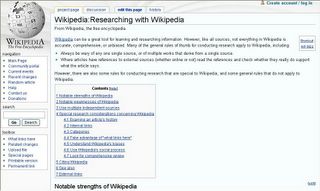 Wikipedia - Researching with Wikipedia Wikipedia:Researching with Wikipedia http://en.wikipedia.org/wiki/Wikipedia:Researching_with_Wikipedia Wikipedia can be a great tool for learning and researching information. However, like all sources, not everything in Wikipedia is accurate, comprehensive, or unbiased. Many of the general rules of thumb for conducting research apply to Wikipedia, including: a) Always be wary of any one single source, or of multiple works that derive from a single source, and b) Where articles have references to external sources (whether online or not) read the references and check whether they really do support what the article says. However, there are also some rules for conducting research that are special to Wikipedia, and some general rules that do not apply to Wikipedia. THis has been added to Research Resources Subject Tracer™ Information Blog. posted by Marcus Zillman | 4:00 AM Wednesday, September 28, 2005 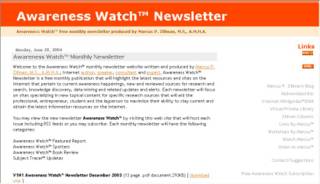 Awareness Watch™ Newsletter V3N10 October 2005 Awareness Watch™ Newsletter V3N10 October 2005 http://virtualprivatelibrary.blogspot.com/Awareness Watch V3N10.pdf Awareness Watch™ Newsletter Blog and Archives http://www.AwarenessWatch.com/ The October 2005 V3N10 Awareness Watch™ Newsletter is a freely available 37 page .pdf document (717KB) from the above URL. The Awareness Watch Featured Report this month features a comprehensive listing of Astronomy Resources on the Internet including astronomy, astrophysics, bioastronomy, radio astronomy, roboscopes and related sources on the Internet. The Awareness Watch Spotters cover many excellent and newly released annotated current awareness research sources and tools as well as the latest identified Internet happenings and resources. The article review covers Precision and Recall of Five Search Engines for Retrieval of Scholarly Information in the Field of Biotechnology by S. M. Shafi and Rafiq A. Rather. posted by Marcus Zillman | 4:15 AM Caribbean Disaster Emergency Response Agency (CDERA) http://www.cdera.org/ The motto of the Caribbean Disaster Emergency Response Agency encapsulates the nature and work of this disaster management organisation which serves the Caribbean Community (CARICOM). This regional inter-governmental agency established in September 1991 by an Agreement of the Conference of Heads of Government of CARICOM to be responsible for disaster management. There are presently sixteen Participating States? within CDERA’s membership. CDERA's main function is to make an immediate and coordinated response to any disastrous event affecting any Participating State, once the state requests such assistance. Other functions include: a) Securing, collating and channeling to interested governmental and non-governmental organizations, comprehensive and reliable information on disasters? affecting the region; b) mitigating or eliminating as far as possible, the consequences of disasters affecting Participating States; c) Establishing and maintaining on a sustainable basis, adequate disaster response capabilities among Participating States; and, d) Mobilizing and coordinating disaster relief from governmental and non-governmental organizations for affected Participating States. posted by Marcus Zillman | 4:10 AM  Applied Bionics and Biomechanics Applied Bionics and Biomechanics http://www.woodheadpublishing.com/en/book.aspx?bookID=882 Applied Bionics and Biomechanics is an international, peer reviewed journal of advanced technological developments based on the science of biological systems. While artificial body parts and related devices (both implantable and extracorporeal) will be a strong focus, other applications of synthetic bionic systems also fall within the scope of the journal, particularly those that are medically-oriented. Issues of public policy relating to developments in bionics, as well as basic research underlying this emerging science, are within the journal¹s scope, provided basic research is accompanied by well-reasoned extrapolation and discussion of potential practical implications for advancing bionics technologies. Applied Bionics and Biomechanics is targeted at readers with an interest in applied aspects of bionics science and technology. Thus, the intended readership includes researchers and practitioners in the fields of biomechanics, bioengineering and synthetic biological systems, developers, manufacturers and distributors of applied bionic technology products, and public policy planners and administrators in the areas of technology and health. This has been added to Biological Informatics Subject Tracer™ Information Blog. posted by Marcus Zillman | 4:05 AM IFPMA Clinical Trials Portal Search http://www.ifpma.org/clinicaltrials.html This service is provided by the IFPMA, on behalf of its Member Companies and Associations. The portal has been designed as a single entry allowing you to search for comprehensive information on on-going clinical trials (registry) or results of completed trials (database) conducted by the innovative pharmaceutical industry. This has been added to Healthcare Resources Subject Tracer™ Information Blog. This will be added to Healthcare Resources 2005 Internet MiniGuide. posted by Marcus Zillman | 4:00 AM Tuesday, September 27, 2005 Community Internet http://www.freepress.net/communityinternet/ High-speed Internet access is fast becoming a basic public necessity — just like water, gas or electricity. But far too many Americans are finding themselves on the wrong side of the digital divide, unable to get connected or afford expensive commercial service. Community Internet is the answer. Soon all media -- TV, telephone, radio and the Web -- will be delivered via the Internet over a broadband connection. New wireless and wired technologies allow local governments, public-private partnerships, schools and community groups to offer faster, cheaper and more reliable Internet service. Hundreds of Community Internet and municipal broadband projects have sprouted up across the country. Click on the map to find a network near you. posted by Marcus Zillman | 4:15 AM Personal World Clock http://www.timeanddate.com/worldclock/personal.html The Personal World Clock allow you to select up to 16 cities or places of special interest, so you could have them displayed on a separate page. Your selected cities will be remembered, so that they will hopefully reappear the next time you visit the site. This has been added to the tools section of Research Resources Subject Tracer™ Information Blog. posted by Marcus Zillman | 4:10 AM Wikis: Disruptive Technologies for Dynamic Possibilities http://www.public.iastate.edu/~gerrymck/TICER2005.ppt Gerry McKiernan is pleased to announce the availability of his PowerPoint presentation titled "Wikis: Disruptive Technologies for Dynamic Possibilities" that was delivered at Digital Libraries à la Carte: Choices for the Future, an international workshop held at Tilburg University, The Netherlands late last month. The presentation reviews the general nature and structure of select wikis, the features and functions of popular wiki software engines, and describes the content and use of wikis by select businesses, colleges and universities, and libraries. The presentation also speculates about the wiki as an environment, framework, and venue for Disruptive Scholarship, his proposed model for alternative scholarly authorship, review, and publishing is available at: [ http://www.disruptivescholarship.blogspot.com/ ]. This has been added to my Bots, Blogs and News Aggregators presentation resources page posted by Marcus Zillman | 4:05 AM Voo2do - Web Based To Do Lists http://www.voo2do.com/ voo2do tracks priority, due date, and time estimates for each task. There is no notion of "lists" in voo2do— tasks can be grouped by project, but you can view and edit a bunch of projects together. Voo2do does not yet support sharing your tasks with other people. This has been added to the tools section of Research Resources Subject Tracer™ Information Blog. posted by Marcus Zillman | 4:00 AM Monday, September 26, 2005  dontbuyjunk Don't Buy Junk http://www.DontButJunk.com/ Their mission is to continue to build a site that can offer you accurate product recommendations for all of your purchases, without allowing these recommendations to be influenced by anything other than real opinions from our users and from around the Web. This has been added to the ShoppingBots Subject Tracer™ Information Blog. posted by Marcus Zillman | 4:15 AM  TypeTester - Compare Screen Type TypeTester - Compare Screen Type http://typetester.maratz.com/ The Typetester is an online application for comparison of the fonts for the screen. It's primary role is to make web designer's life easier. As the new fonts are bundled into operating systems, the list of the common fonts will be updated. This has been added to World Wide Web Reference Subject Tracer™ Information Blog. posted by Marcus Zillman | 4:10 AM Austrian Journal of Statistics http://www.statistik.tuwien.ac.at/oezstat/ The journal is published approximately quarterly by the Austrian Statistical Society, Institut für Statistik, Wirtschaftsuniversität Wien, Augasse 2-6, A-1090 Vienna, Austria. Its general objective is to promote and extend the use of statistical methods in all kind of theoretical and applied disciplines. Special emphasis is on methods and results in official or governmental statistics. Original papers and review articles will be published in the Austrian Journal of Statistics if judged consistently with these general aims. All papers will be refereed. Special topics sections will appear from time to time. Each section will have as a theme a specialized area of statistical application, theory, or methodology. This has been added to Statistical Resources Subject Tracer™ Information Blog. posted by Marcus Zillman | 4:05 AM The American Distance Education Consortium http://www.adec.edu/ Interest in distance education within institutions of higher learning dates as far back as the correspondence programs first offered by the University of Chicago and Columbia University in the late 19th century. There are a host of organizations currently involved in disseminating and promoting the cause of distance education, the American Distance Education Consortium (ADEC), is one of the most notable. The ADEC is composed of approximately 65 state university and land grant colleges and as an organization is primarily concerned with creating a model of distance education that will provide instructional delivery and access anywhere and anytime. On their site, visitors can learn about a host of distance learning delivery technologies, read up on best practices developed by ADEC member institutions and individuals, and federal programs and grants designed to assist those with an interest in the subject. This will be added to Education and Distance Learning Resources 2005 Internet MiniGuide. [From The Scout Report, Copyright Internet Scout Project 1994-2005. http://scout.wisc.edu/] posted by Marcus Zillman | 4:00 AM Sunday, September 25, 2005 The Government Domain - RSS and Uncle Sam by Peggy Garvin http://www.llrx.com/columns/govdomain9.htm Peggy Garvin examines the cautious nature with which the federal government is embracing RSS feeds. She highlights RSS feeds currently available from a range of agencies, and also suggests useful tools and sources to locate feeds as they become available. This has been added to the presentation resources of my Bots, Blogs and News Aggregators presentation. posted by Marcus Zillman | 4:15 AM SemaPedia.org - Combining Semacode with Wikipedia http://www.semapedia.org/ Their goal is to combine the physical annotation technology of semacode with the availability of high quality information using the free encyclopedia Wikipedia. Imagine your cellphone as your smart travelguide. Their promise is to provide free relevant ad-hoc high quality information to mobile users in the real world. This has been added to the tools section of Research Resources Subject Tracer™ Information Blog. posted by Marcus Zillman | 4:10 AM  Free Geography Web Games Free Geography Web Games http://www.sheppardsoftware.com/Geography.htm Free Geography Web Games - Click On a Region To Play. Have fun learning the countries, capitals, and geography around the world with these free web games. This has been added to Game Resources Subject Tracer™ Information Blog. posted by Marcus Zillman | 4:05 AM RTDinfo: Magazine on European Research http://europa.eu.int/comm/research/rtdinfo/index_en.html RTD info is a quarterly magazine published by the European Commission presenting a mix of research results and debate on scientific subjects of interest to a wide, non-specialised readership. The common theme is Europe. This has been added to Research Resources Subject Tracer™ Information Blog. posted by Marcus Zillman | 4:00 AM Saturday, September 24, 2005 AtomEnabled http://atomenabled.org/ Atom is a simple way to read and write information on the web, allowing you to easily keep track of more sites in less time, and to seamlessly share your words and ideas by publishing to the web. If you're new to Atom, you can find out more about what Atom can do for you. Or if you just want to get started, tools and services which work with the Atom format are listed in the AtomEnabled directory. Created by leading service providers, tool vendors and independent developers, Atom is designed to be a universal publishing standard for personal content and weblogs. Technical information about working with the Atom format is available at the developer information page, and publications or weblogs that are interested in the benefits of being AtomEnabled can find out more about the benefits of Atom for publishers. This has been added to the resources section of my presentation titled Bots, Blogs and News Aggregators. posted by Marcus Zillman | 4:15 AM 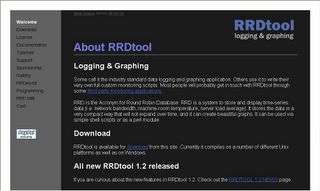 RRDtool RRDtool http://people.ee.ethz.ch/~oetiker/webtools/rrdtool/ Some call it the industry standard data logging and graphing application. Others use it to write their very own full custom monitoring scripts. Most people will probably get in touch with RRDtool through some third party monitoring applications. RRD is the Acronym for Round Robin Database. RRD is a system to store and display time-series data (i.e. network bandwidth, machine-room temperature, server load average). It stores the data in a very compact way that will not expand over time, and it can create beautiful graphs. It can be used via simple shell scripts or as a perl module. This has been added to World Wide Web Reference Subject Tracer™ Information Blog. posted by Marcus Zillman | 4:10 AM Agricultural Economics Review http://www.eng.auth.gr/mattas/eng.htm Agricultural Economics Review is the official publication of the Greek Association of Agricultural Economists. The purpose of the Agricultural Economics Review is to provide a new forum for the exchange and dissemination of ideas among scientists in order to encourage the development of theoretical and applied research in the field of Agricultural Economists. Specific topics covered include: a) economics of agricultural resources and the environment, b) agricultural policy, c) international trade, d) marketing of agricultural products, e) production economics, f) agricultural sociology, and g) agricultural extension and education. This has been added to Agriculture Resources Subject Tracer™ Information Blog. posted by Marcus Zillman | 4:05 AM 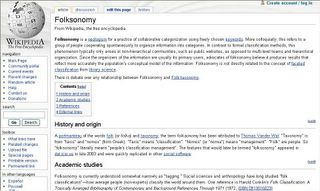 Folksonomy Folksonomy http://en.wikipedia.org/wiki/Folksonomy Folksonomy is a neologism for a practice of collaborative categorization using freely chosen keywords. More colloquially, this refers to a group of people cooperating spontaneously to organize information into categories. In contrast to formal classification methods, this phenomenon typically only arises in non-hierarchical communities, such as public websites, as opposed to multi-level teams and hierarchical organization. Since the organizers of the information are usually its primary users, advocates of folksonomy believe it produces results that reflect more accurately the population's conceptual model of the information. Folksonomy is not directly related to the concept of faceted classification from library science. This has been added to Social Informatics Subject Tracer™ Information Blog. posted by Marcus Zillman | 4:00 AM Friday, September 23, 2005  October 2005 Zillman Column - Entrepreneurial Resources October 2005 Zillman Column - Entrepreneurial Resources http://VirtualPrivateLibrary.BlogSpot.com/Entrepreneurial Resources Oct05 Column.pdf http://www.zillmancolumns.com/ The October 2005 Zillman Column is now available and is titled Entrepreneurial Resources. This October column is a comprehensive listing of entrepreneur and small business resources on the World Wide Web. Looking to become a budding entrepreneur? Looking for resources to keep your entrepreneurial organization at the leading edge? These resources and sites on the Internet will be an exciting starting point for you! Download this excellent 16 page free .pdf (384KB) column today. © 2005 Marcus P. Zillman, M.S., A.M.H.A. posted by Marcus Zillman | 4:15 AM Handbook for Bloggers and Cyber-Dissidents http://www.rsf.org/rubrique.php3?id_rubrique=542 Blogs get people excited. Or else they disturb and worry them. Some people distrust them. Others see them as the vanguard of a new information revolution. Because they allow and encourage ordinary people to speak up, they’re tremendous tools of freedom of expression. Bloggers are often the only real journalists in countries where the mainstream media is censored or under pressure. Only they provide independent news, at the risk of displeasing the government and sometimes courting arrest. Reporters Without Borders has produced this handbook to help them, with handy tips and technical advice on how to to remain anonymous and to get round censorship, by choosing the most suitable method for each situation. It also explains how to set up and make the most of a blog, to publicise it (getting it picked up efficiently by search-engines) and to establish its credibility through observing basic ethical and journalistic principles. This has been added to my presentation resources at Bots, Blogs and News Aggregators. posted by Marcus Zillman | 4:10 AM 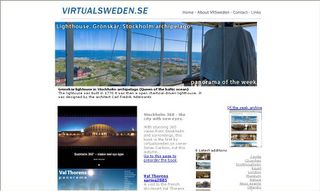 Virtual Sweden Virtual Sweden http://www.virtualsweden.se/ Panoramic photographs that immerse their audience in a landscape have been in vogue throughout the history of photographic enterprises. With this in mind, users should not be surprised to learn of the existence of the Virtual Sweden website. Established by Jonas Carlson in 2003, the site contains 360 degree panoramic images taken by Carlson from a wide variety of locales across the globe. Of course, visitors should start by looking at the panoramic photograph taken from the Gronskar lighthouse in the Stockholm archipelago, but then they would be remiss not to look at some of the other available images. Some of the other places Carlson has seen fit to document are Rome, Thailand, Egypt, and London. Visitors can peruse a thematic list of these locations, or they may simply go straight to his "Latest additions" list, which is also on the site's homepage. [ From The Scout Report, Copyright Internet Scout Project 1994-2005. http://scout.wisc.edu/] posted by Marcus Zillman | 4:05 AM 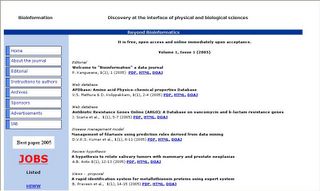 Bioinformation Journal for Beyond Bioinformatics Bioinformation http://www.bioinformation.net/ Beyond Bioinformatics: It is free, open access and online immediately upon acceptance. Bioinformation is an online journal publishing research articles in biological knowledge discovery after full peer review. Bioinformation is added in DOAJ and listed in HIWW. All articles are published, without barriers to access, immediately upon acceptance. The abstracts of published papers will be indexed in major indexing databases after the completion of one year from the launch date. Bioinformation publishes original research articles in all aspects of biological knowledge discovery through mathematical and computational analysis of biological data. The journal specifically invites articles describing new biological insights based on primary or derived data. This has been added to Biological Informatics Subject Tracer™ Information Blog. posted by Marcus Zillman | 4:00 AM Thursday, September 22, 2005 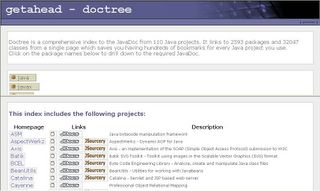 DocTree - Large JavaDoc Index DocTree - Large JavaDoc Index http://getahead.ltd.uk/doctree/ Doctree is a comprehensive index to the JavaDoc from 110 Java projects. It links to 2593 packages and 32047 classes from a single page which saves you having hundreds of bookmarks for every Java project you use. This has been added to World Wide Web Reference Subject Tracer™ Information Blog. posted by Marcus Zillman | 4:15 AM International Journal of Accounting Information Systems http://www.sciencedirect.com/science/journal/14670895 The International Journal of Accounting Information Systems will publish thoughtful, well developed articles that examine the rapidly evolving relationship between accounting and information technology. Articles may range from empirical to analytical, from practice-based to the development of new techniques, but must be related to problems facing the integration of accounting and information technology. The journal will address (but will not limit itself to) the following specific issues: control and auditability of information systems; management of information technology; artificial intelligence research in accounting; development issues in accounting and information systems; human factors issues related to information technology; development of theories related to information technology; methodological issues in information technology research; information systems validation; humancomputer interaction research in accounting information systems. This will be added to Business Resources 2005 Internet MiniGuide. posted by Marcus Zillman | 4:10 AM Go-Geo! - Geo-Spatial Datasets and Related Resources http://www.gogeo.ac.uk/ Go-Geo! is the UK academic spatial data portal operated and maintained by EDINA National Data Centre, University of Edinburgh. The portal is a key component of the UK academic Spatial Data Infrastructure (SDI) and is financially supported by the Joint Information Services Committee (JISC). Go-Geo! offers access to information about all things spatial for researchers, teaching staff and students in UK further and higher education institutions. It's principle function is as a data discovery tool, searching metadata catalogues across the UK. This is now augmented by a Metadata Editor tool, allowing individuals to create and edit their own metadata to describe spatial data they either have collected or curate. Go-Geo! also offers links to other GI-related quality controlled resources, such as books in print, photographs, online mapping and data services, software, training courses, events, discussion forums and useful organisations. Go-Geo! aims to support the full research project life cycle. This has been added to the tools section of Research Resources Subject Tracer™ Information Blog. This has been added to Knowledge Discovery Subject Tracer™ Information Blog. This will be added to my white paper Academic and Scholar Search Engines and Sources. posted by Marcus Zillman | 4:05 AM Codase - Source Code Search Engine http://www.codase.com/ Codase is the leading source code search company with advanced source code understanding and xml index/search technologies. Rather than treating code as text, Codase understands programming languages, and treats code as code, the way it's supposed to be. This unique and syntax-aware approach provides the most accurate and detailed search results with fine granularity levels of controls. With Codase, one can search functions, classes, strings, constants, macros, comments and other programming language constructs. Codase hosts huge amount of open source codes providing a much better coverage, as it covers codes usually hidden inside compressed files and source control repositories, where general search engines fail to find and index. In addition, Codase only indexes and searches high quality codes with every line of code literally validated and compiled by intelligent and powerful source code analysis engine. Codase is a privately held company based in silicon valley, founded by Dr. Huihong Luo and other veterans. They are a group of innovative and passionate professionals with diverse technologies, business background and proven track of records. They are committed to make Codase the world's best search engine for source codes in terms of features, quality, performance and code coverage. If you are a developer, you may find Codase useful, since improving your coding productivity is their goal. This has been added to Script Resources Subject Tracer™ Information Blog. posted by Marcus Zillman | 4:00 AM Wednesday, September 21, 2005 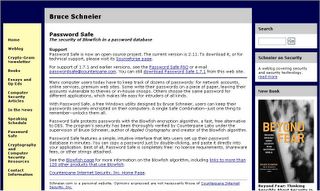 Password Safe Password Safe - The Security of Blowfish In a Password Database http://www.schneier.com/passsafe.html With Password Safe, a free Windows utility designed by Bruce Schneier, users can keep their passwords securely encrypted on their computers. A single Safe Combination--just one thing to remember--unlocks them all. Password Safe protects passwords with the Blowfish encryption algorithm, a fast, free alternative to DES. The program's security has been thoroughly verified by Counterpane Labs under the supervision of Bruce Schneier, author of Applied Cryptography and creator of the Blowfish algorithm. Password Safe features a simple, intuitive interface that lets users set up their password database in minutes. You can copy a password just by double-clicking, and paste it directly into your application. Best of all, Password Safe is completely free: no license requirements, shareware fees, or other strings attached. Password Safe is now an open source project. This has been added to the tools section of Research Resources Subject Tracer™ Information Blog. This will be added to Security Resources 2005 Internet MiniGuide. posted by Marcus Zillman | 4:15 AM Internet Society Disability and Special Needs Chapter http://www.isocdisab.org/ This is the first chapter in the Internet Society that is not a geographically based chapter. It is dedicated to addressing the needs of people with special needs that are related to the Internet and its attendant technologies. The pages on this site will explain more about the chapter. This chapter represents a journey for all of us who are members and who are dedicated to creating equal access to the Internet regardless of disability. This has been added to World Wide Web Reference Subject Tracer™ Information Blog. posted by Marcus Zillman | 4:10 AM Center for Media Research http://www.mediapost.com/research/index.cfm?loc=1 Market and media intelligence is required for each step in the media planning and implementation process. The Center for Media Research helps to acquire, organize, analyze and present the necessary statistical and qualitative information to support or direct strategic decisions… and make those decisions fast and accurately. The Center For Media Research provides: a) Daily alertness to and briefings on breaking media research news that will impact planning and buying decisions, b) Research reports and studies to help develop and improve media plans, strategies, actics, performance and placement, and c) Selected resources and links to help media planners and buyers leverage the internet to identify and reach targeted audiences efficiently and effectively. The constant research digging, reporting and writing by the Center For Media Research will keep you informed about the marketplace, aware of the media serving it, abreast of the breaking opportunities, and in tune with the world. This has been added to Business Intelligence Resources Subject Tracer™ Information Blog. This has been added to Research Resources Subject Tracer™ Information Blog. This will be added to Advertising, Marketing and Public Relations Resources 2005 Internet MiniGuide. posted by Marcus Zillman | 4:05 AM Review of Social Economy: The Journal of the Association for Social Economics http://www.tandf.co.uk/journals/titles/00346764.asp For over sixty years the Review of Social Economy has published high quality peer-reviewed papers on the many relationships between social values and economics. Among the subjects addressed are income distribution, justice and equity, poverty, cooperation, human dignity, labour, workplace organization, gender, need, the environment, economic institutions, economics methodology and class. Among the orientations of the Review's authors are social and socio-economics, institutionalist, solidarist, cooperativist, Post-Marxist and radical, feminist, Post Keynesian, behavioralist, and environmentalist. Papers published are both empirical and conceptual. The final issue of each volume is guest edited, and devoted to a special theme or individual in social economics. The journal also includes short papers and comments, book reviews and review essays, and announcements of future meetings. This has been added to Social Informatics Subject Tracer™ Information Blog. posted by Marcus Zillman | 4:00 AM Tuesday, September 20, 2005  Open Access Webliography Open Access Webliography http://www.escholarlypub.com/cwb/oaw.htm This webliography by Adrian K. Ho and Charles W. Bailey, Jr., presents a wide range of electronic resources related to the open access movement that are freely available on the Internet as of April 2005. In basic terms, the goal of the open access movement is to make scholarly articles freely available in digital form worldwide with minimal restrictions on their use (e.g., proper attribution of authorship). In reality, it's more complex than this because of differences of opinion about what open access should or shouldn't try to achieve. Some advocates say free access to scholarly articles is enough, minimal restrictions are not needed. Others say that the basic goal is correct, but permanent archiving is also required. Still others say why stop at scholarly articles, make all types of scholarly literature freely available in digital form. Such doctrinal differences are normal and healthy in such an important and dynamic movement. This very brief discussion will focus strictly on digital versions of scholarly articles; however, the reader should understand that digital archives and repositories may contain other types of digital materials. This will be added to Academic Resources 2005 Internet MiniGuide. This has been added to Research Resources Subject Tracer™ Information Blog. posted by Marcus Zillman | 4:15 AM Joomla! Content Management System http://www.joomla.org/ Joomla! is one of the most powerful Open Source Content Management Systems on the planet. It is used all over the world for everything from simple websites to complex corporate applications. Joomla! is easy to install, simple to manage, and reliable. Joomla! is a Content Management System (CMS) created by the same award-winning team that brought the Mambo CMS to its current state of stardom. The name Joomla! is a phonetic spelling for the Swahili word "Jumla", which means "all together" or "as a whole". It was chosen as the entire teams behind Mambo were unanimous in their commitment to protecting the interests of the creators and community, which was the true cause for the success and acclaim earned by that project. This name was chosen from thousands of recommendations by the community, and even went through an arduous review session by branding and marketing professionals who also felt that Joomla! was the best choice of the lot. What sets Joomla! apart from the rest is their dedication to keeping things as simple as possible, while providing the most features possible. Finally, non-technical people can have complete control over their websites without paying exhorbitant amounts for closed, proprietary software. Joomla! is more than just software, it is people. The community behind Joomla! includes developers, designers, systems administrators, translators, content writers, and most importantly the end users. This has been added to World Wide Web Reference Subject Tracer™ Information Blog. posted by Marcus Zillman | 4:10 AM europrospectus.com http://www.europrospectus.com/ europrospectus.com - the world's largest text, clause and field searchable online library of debt, equity, derivative and M&A prospectuses. Serving the global capital markets, clients using our service can find in seconds what would otherwise have taken days, if not weeks, to track down. Once they have identified a document (or clause) as relevant, our service automatically suggests documents (or clauses) of deals that look similar. We provide documents in many formats including PDF, Microsoft Word (for copying and pasting) and HTML which has online Hit-to-Hit text navigation and Key Term discovery. Currently we offer more than 250,000 prospectuses and add about 1,500 new documents each week. This hyperlink is a good resource for professionals who wish to find the prospectus of a security issue. This has been added to Financial Resources Subject Tracer™ Information Blog. posted by Marcus Zillman | 4:05 AM 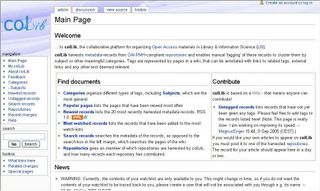 colLib - MetaData Records Harvester colLib - MetaData Records Harvester http://collib.info/index.php/Main_Page colLib is the collaborative platform for organizing Open Access materials in Library & Information Science (LIS). Harvests metadata-records from OAI-PMH-compliant repositories and enables manual 'tagging' of these records to cluster them by subject or other meaningful categories. Tags are represented by pages in a wiki, that can be annotated with links to related tags, external links and any other text deemed relevant. This will be added to Academic Resources 2005 Internet MiniGuide. posted by Marcus Zillman | 4:00 AM Monday, September 19, 2005 Plazes http://www.plazes.com/ Plazes is a grassroot approach to location-aware interaction, using the local network you are connected to as location reference. Plazes allows you to share your location with the people you know and to discover people and plazes around you. It's the navigation system for your social life and it's absolutely free. This has been added to Social Informatics Subject Tracer™ Information Blog. posted by Marcus Zillman | 4:15 AM  Truveo Video Search Engine Truevo - Video Search Engine http://www.truveo.com/ Latest Press Release here. BURLINGAME, Calif.--(BUSINESS WIRE)--Sept. 14, 2005--Truveo(TM), a start-up company emerging from stealth mode today, launched a new video search engine that delivers higher quality and more up-to-the-minute results than traditional search engines. Based on a unique technology for indexing video using the visual characteristics of web pages, the Truveo search engine can find video on the Web that all other search engines miss. Truveo released a beta version of its search product today. While the development of Truveo's unique crawling technology has taken nearly two years, Truveo has only recently put this new technology into production and has already indexed an extensive collection of video that cannot be found with current search engines. On its site, Truveo invites users to compare its results against those of Google and Yahoo! In the next six months, the company expects to significantly improve the breadth and quality of its search listings. "Despite many years of development, video search engines today are scarcely better than the original video search engines introduced a decade ago," said Tim Tuttle, co-founder and CEO of Truveo. "For search to reach the next level and become truly ubiquitous, a fundamentally new approach is required to rapidly find and organize the vast amounts of television, movie and video content created every minute. At Truveo, our mission is to build an engine that indexes all of the video on the web, giving users the most relevant and up-to-date results for any video search, be it the latest on Hurricane Katrina or Britney Spears." Under the Hood: Visual Crawler(TM)- Truveo was started by Tim Tuttle and Adam Beguelin, veteran search and networking technologists. In early 2004, they began development of a technology, called the "Visual Crawler," which is the foundation of the Truveo search engine. Truveo's "Visual Crawler" is capable of identifying the visual characteristics of a web application, as a human would. Using this approach, the crawler is able to locate video that is normally invisible to standard crawlers. Additionally, once the "Visual Crawler" locates a video, it can also find an abundance of contextual information, or metadata that relates to each video. Due to the ability to mine this rich metadata, when a user types a query into Truveo, such as "Lance Armstrong," the search engine can return the most relevant and up-to-the-minute videos on Armstrong's latest developments. This has been added to the search engine section of all the 2005 Internet MiniGuides. posted by Marcus Zillman | 4:10 AM  FoodieView Search Engine FoodieView - Recipe Search Engine http://www.foodieview.com/ With FoodieView, you can search the major recipe sites all from one place, then save any recipes that you like in one central place. Just use the FoodieView recipe search page to look for recipes you want. If you see one that you like, just click the "Add to Recipe Box" link. This will be added to the search engines section of all the 2005 Internet MiniGuides. posted by Marcus Zillman | 4:05 AM |
|
||||
|
|
|||||